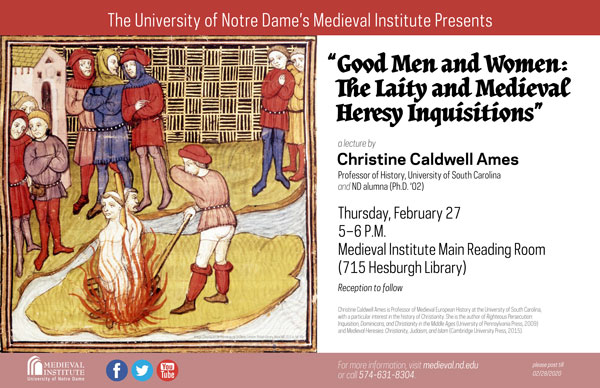Alumni Lecture: Christine Caldwell Ames (USC), "Good Men and Women: The Laity and Medieval Heresy Inquisitions"

The Medieval Institute presents a lecture by Christine Caldwell Ames (Ph.D., '02). A reception will follow the lecture.
Lecture abstract: The image of the diabolical inquisitor, fiercely chasing his unchecked whims against suspected heretics, is a durable one. Equally familiar is lay resistance to ecclesiastical efforts against heresy, whether through violence, deception, or silence. Yet many lay men and women in medieval Europe participated in, or actively supported, the fight against heresy. Members of the laity played various roles in the religious persecution of their neighbors, from waging war to advising on inquisitorial procedure to serving as jailers. Such cooperation is largely overlooked in scholarship in favor of a binary opposition of inquisitors versus communities. Yet attention to these lay roles contributes to a more nuanced understanding of the mechanics of oppression in medieval Europe and to its religious foundations. It also poses the challenging question of how historians evaluate guilt and responsibility for persecution in the past.
Christine Caldwell Ames is Professor of Medieval European History at the University of South Carolina, with a particular interest in the history of Christianity. She is the author of Righteous Persecution: Inquisition, Dominicans, and Christianity in the Middle Ages (University of Pennsylvania Press, 2009) and Medieval Heresies: Christianity, Judaism, and Islam (Cambridge University Press, 2015). She has published several articles and book chapters on heresy, inquisition, and meanings of “religion” both in the Middle Ages and in modern scholarship, including “Does Inquisition Belong to Religious History?” The American Historical Review, 2005). Professor Ames has delivered numerous invited papers on these topics in the United States and abroad. Her work has received support from the NEH, the Mellon Foundation, and the Fulbright Program. She is also a Ph.D. graduate of the University of Notre Dame.